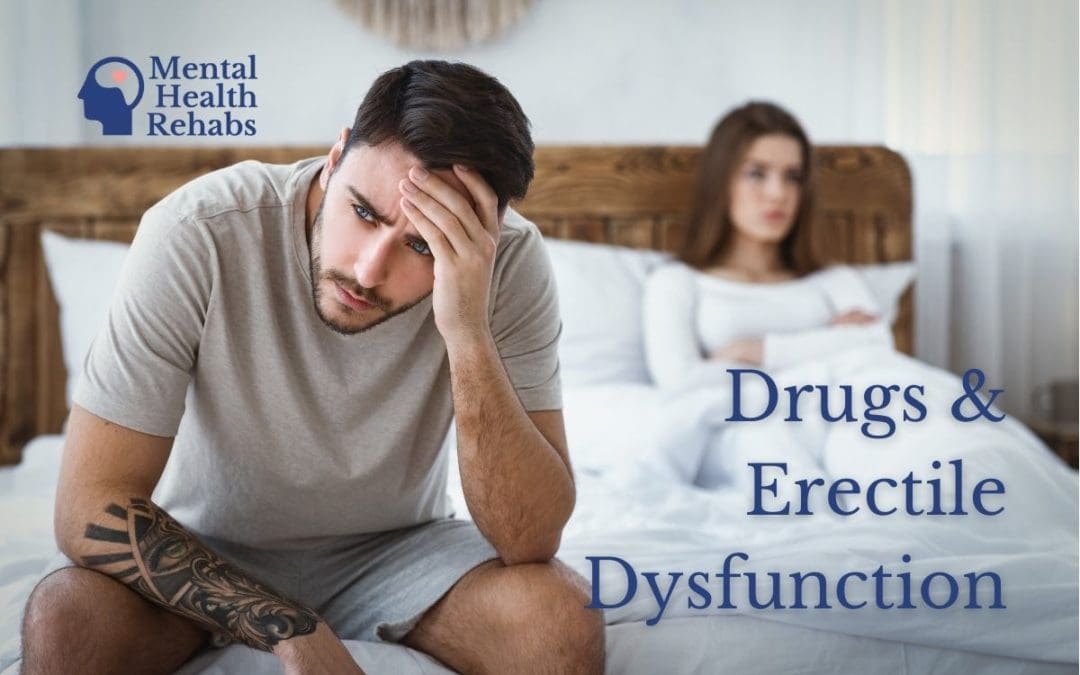Erectile dysfunction (ED) is a common medical problem. It’s estimated to affect 52% of men to some degree–a number that increases significantly with age (a study found that 40% of 40-year-old men experienced erectile dysfunction and 70% of 70-year-old men. Though age is the most meaningful variable that can predict a person’s likelihood of having ED, it’s not the only possible cause. Erectile dysfunction is a fairly common side effect of many types of clinical medications and illicit substances. In this article, we will cover the different types of drugs that cause erectile dysfunction, why, and how to minimize your risk.
What Is Erectile Dysfunction?
Before diving into the who and why of drugs that can cause erectile dysfunction, it’s pertinent to clarify the definition of this medical disorder. There are several circumstances that are considered to be ED:
- An inability to develop an erection
- An inability to maintain an erection for satisfactory sexual activity
- Premature ejaculation (ejaculation that occurs prior to or within approximately one minute of penetration or an inability to delay ejaculation)
Despite how commonplace this issue is, there is no single, official criterium for what erectile dysfunction is. The only specification in the DSM-5 is that these issues persist for at least six months.
As such, some entities and professionals have attempted to create more specific qualifying criteria. The general rule is that failure to get an erection more than 50% of the time is considered to be an issue where treatment is needed.
What Causes Erectile Dysfunction?
The process of arousal is highly complex. It involves hormones sending signals to the brain to activate the parasympathetic nervous system which in turn activates a whole wave or other neurochemicals that signal enhanced blood flow to the penis. With so many moving parts to this process, there are a number of factors that can end up impairing the body’s ability to engage in sexual activity.
Cardiovascular Disease
With blood flow being the primary facilitator of a successful erection, it’s unsurprising then that heart issues can interfere with the ability to get erect (49% of study participants with coronary artery disease reported significant erectile dysfunction). Atherosclerosis, hypertension, and hyperlipidemia are well-known factors of ED.
Neurological Disorders
Nerves are responsible for sending sensory information to and from the brain, instructing it on how to interpret the world around it and control the body’s response. Sacral nerves of the parasympathetic nervous system in the lower pelvis are closely linked to managing erection response. Misfiring neurons (and diseases that cause such misfirings) can, in turn, affect the penis’ stimulation.
Mental Health
Stress, anxiety, and depression can negatively affect neurotransmitters and hormones, making it difficult for the body to send and receive the proper cues to become aroused, signal the penis to become erect or maintain an erection. Mental illnesses can also contribute to physiological ailments that impair sexual functioning.
Hormone Abnormalities
There are a plethora of hormones involved in the arousal process and physical preparation for sexual intercourse. As such, there are many different types of hormone disruptions that might result in ED: irregular thyroid hormones caused by steroid abuse, naturally occurring low testosterone, or hormones administered for prostate cancer.
List of Drugs That Are Associated With Erectile Dysfunction
Given the many potential causes of erectile dysfunction, it’s easy to see how drugs, which manipulate the body in numerous ways, can end up interfering with the body’s sexual response. Can illegal drugs cause erectile dysfunction too? Yes. Any chemical that interferes with hormones, neurotransmitters, heart function–or causes symptoms that might do these things–has the potential to cause erectile dysfunction.
- Alcohol
- Amphetamines
- Anti-seizure medications
- Antiarrhythmics
- Antidepressants
- Antihistamines
- Antihypertensives
- Antipsychotics
- Barbiturates
- Benzodiazepines
- Beta-blockers
- Blood pressure medications
- Chemotherapy medications
- Cocaine
- Diuretics
- Histamine H2-receptor antagonists
- Marijuana
- Methadone
- Muscle relaxants
- Nicotine
- Nonsteroidal anti-inflammatory drugs
- Opioids (codeine, fentanyl, hydromorphone, morphine, oxycodone)
- Parkinson’s disease drugs
- Prostate cancer drugs
- Statins and fibrates
- Tranquilizers
Can Medication-Induced Sexual Dysfunction Be Cured?
The good news is that if erectile dysfunction was caused by medications, it’s likely not permanent. In such cases, symptoms should subside once the offending medication is no longer being taken. However, it is very unsafe to stop using a medication without first consulting a doctor. There are options for managing erectile dysfunction while still taking medication.
First, allow your body time to adjust to the medication. The shock of a novel new medication in the body could cause it to have much stronger effects in the first few days or weeks than it will in a year’s time. Lowering the dosage may also lessen the effects of sexual impairment, but should only be done with the consult of a medical professional. If neither option works, consider speaking to a mental health professional near you that can help address the psychological causes of erectile dysfunction.

